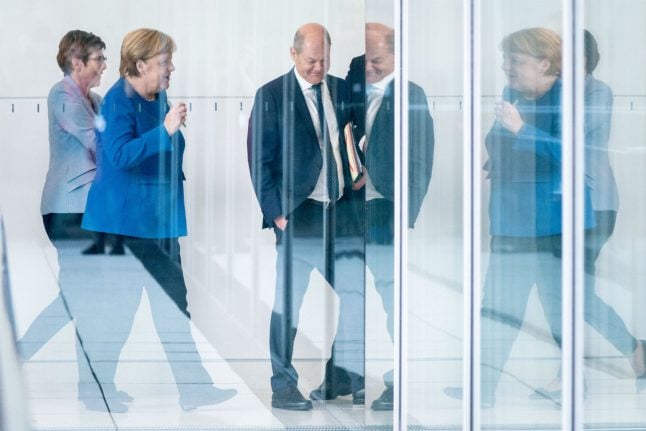The German leader told conservative MPs that the idea of a security area was “very promising, even if there are many open questions”, sources from her parliamentary group told AFP.
But the initiative from Defence Minister Annegret Kramp-Karrenbauer met with resistance from leading Social Democrats, junior partners in Merkel's ruling right-left coalition.
Foreign Minister Heiko Maas told reporters the notion had provoked “a certain degree of irritation” among Germany's NATO allies.
Turkey's military intervention against Kurdish fighters in northeastern Syria launched earlier this month, as well as Russia's backing for the Damascus regime, mean “there are high hurdles for any internationalisation of the solution to the conflict,” Maas said.
For now, Berlin “has engaged with efforts to resolve the conflict” with “diplomatic and humanitarian” means, he added.
There had been “no discussion” of an international mission to northeast Syria with Germany's allies, Maas said, recalling also the failure of a similar plan for Aleppo in late 2016.
Not 'simply an onlooker'
Kramp-Karrenbauer had told broadcaster Deutsche Welle on Monday that a security zone could allow international forces, including European troops, to “resume the fight against terror and against the Islamic State” group (IS) as well as “stabilize the region so that rebuilding civilian life is once again
possible”.

German Bundeswehr troops in Afghanistan in March 2018. Photo: DPA
The defence chief is keen to involve German soldiers, although a deployment would have to be in line with international law and secure approval from parliament.
READ ALSO: More women soldiers and less equipment: A look at Germany's army in numbers
Europe and Germany must “come up with our own recommendations and initiate discussions,” rather than being “simply… an onlooker” Kramp-Karrenbauer said.
She added that she had already floated her proposal to the British, American and French defence ministers and would discuss it further at a meeting of the NATO alliance in Brussels on Thursday and Friday.
Sources said Merkel pledged to discuss the safe zone idea during a previously planned meeting with the leaders of France, Britain, and Turkey ahead of a December NATO summit.
On Tuesday evening, Turkey and Russia agreed to ensure Kurdish forces withdraw from areas close to Syria's border with Turkey and to launch joint patrols.
The announcement followed marathon talks between Russian President Vladimir Putin and his Turkish counterpart Recep Tayyip Erdogan in the southern Russian city of Sochi.
It also came shortly before the end of a US-brokered ceasefire between Turkish forces and Kurdish fighters in northeastern Syria.
Turkey quickly moved to clear a “security zone” of Kurdish forces following President Donald Trump's announcement he would withdraw troops from the region.
The Kurds provided indispensable ground fighters in the US-led international coalition against IS, but their YPG forces are considered “terrorists” by Turkey.
Russia is a crucial ally of Syrian President Bashar al-Assad and has demanded that Turkey respect the country's territorial integrity.
When asked about Kramp-Karrenbauer's safe zone proposal, Kremlin spokesman Dmitry Peskov withheld judgement.
“We don't have a position because this is a new initiative,” he said. “We need to study it.”




 Please whitelist us to continue reading.
Please whitelist us to continue reading.
Member comments